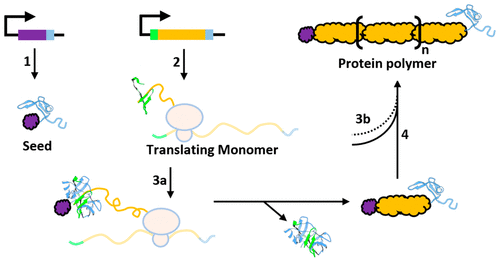当前位置:
X-MOL 学术
›
ACS Synth. Biol.
›
论文详情
Our official English website, www.x-mol.net, welcomes your
feedback! (Note: you will need to create a separate account there.)
Seeded Chain-Growth Polymerization of Proteins in Living Bacterial Cells.
ACS Synthetic Biology ( IF 3.7 ) Pub Date : 2019-11-19 , DOI: 10.1021/acssynbio.9b00362 Christopher Hyde Bowen , Tavis J Reed , Cameron Jay Sargent , Beryl Mpamo , Jonathan M Galazka 1 , Fuzhong Zhang
ACS Synthetic Biology ( IF 3.7 ) Pub Date : 2019-11-19 , DOI: 10.1021/acssynbio.9b00362 Christopher Hyde Bowen , Tavis J Reed , Cameron Jay Sargent , Beryl Mpamo , Jonathan M Galazka 1 , Fuzhong Zhang
Affiliation

|
Microbially produced protein-based materials (PBMs) are appealing due to use of renewable feedstock, low energy requirements, tunable side-chain chemistry, and biodegradability. However, high-strength PBMs typically have high molecular weights (HMW) and repetitive sequences that are difficult to microbially produce due to genetic instability and metabolic burden. We report the development of a biosynthetic strategy termed seeded chain-growth polymerization (SCP) for synthesis of HMW PBMs in living bacterial cells. SCP uses split intein (SI) chemistry to cotranslationally polymerize relatively small, genetically stable material protein subunits, effectively preventing intramolecular cyclization. We apply SCP to bioproduction of spider silk in Escherichia coli, generating HMW spider silk proteins (spidroins) up to 300 kDa, resulting in spidroin fibers of high strength, modulus, and toughness. SCP provides a modular strategy to synthesize HMW, repetitive material proteins, and may facilitate bioproduction of a variety of high-performance PBMs for broad applications.
中文翻译:

活细菌细胞中蛋白质的种子链增长聚合。
微生物生产的蛋白质基材料(PBM)的吸引力在于可再生原料的使用,低能耗,可调节的侧链化学和可生物降解性。但是,高强度PBM通常具有高分子量(HMW)和重复序列,由于遗传不稳定和代谢负担,这些序列很难通过微生物产生。我们报告了称为种子链增长聚合(SCP)的生物合成策略的发展,该策略用于在活细菌细胞中合成HMW PBM。SCP使用分裂内含子(SI)化学物质共翻译聚合相对较小的,遗传上稳定的物质蛋白亚基,从而有效防止分子内环化。我们将SCP应用于大肠杆菌中蜘蛛丝的生物生产,产生高达300 kDa的HMW蜘蛛丝蛋白(spidroins),产生高强度,高模量和高韧性的刺胶纤维。SCP提供了一种模块化策略来合成HMW,重复性材料蛋白,并可能促进多种高性能PBM的生物生产,从而获得广泛的应用。
更新日期:2019-11-20
中文翻译:

活细菌细胞中蛋白质的种子链增长聚合。
微生物生产的蛋白质基材料(PBM)的吸引力在于可再生原料的使用,低能耗,可调节的侧链化学和可生物降解性。但是,高强度PBM通常具有高分子量(HMW)和重复序列,由于遗传不稳定和代谢负担,这些序列很难通过微生物产生。我们报告了称为种子链增长聚合(SCP)的生物合成策略的发展,该策略用于在活细菌细胞中合成HMW PBM。SCP使用分裂内含子(SI)化学物质共翻译聚合相对较小的,遗传上稳定的物质蛋白亚基,从而有效防止分子内环化。我们将SCP应用于大肠杆菌中蜘蛛丝的生物生产,产生高达300 kDa的HMW蜘蛛丝蛋白(spidroins),产生高强度,高模量和高韧性的刺胶纤维。SCP提供了一种模块化策略来合成HMW,重复性材料蛋白,并可能促进多种高性能PBM的生物生产,从而获得广泛的应用。


















































 京公网安备 11010802027423号
京公网安备 11010802027423号